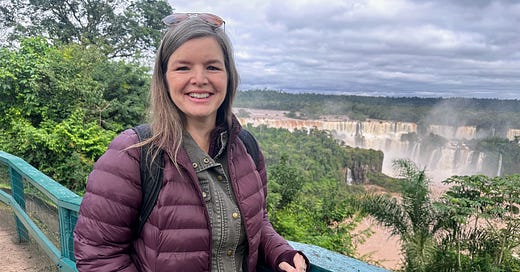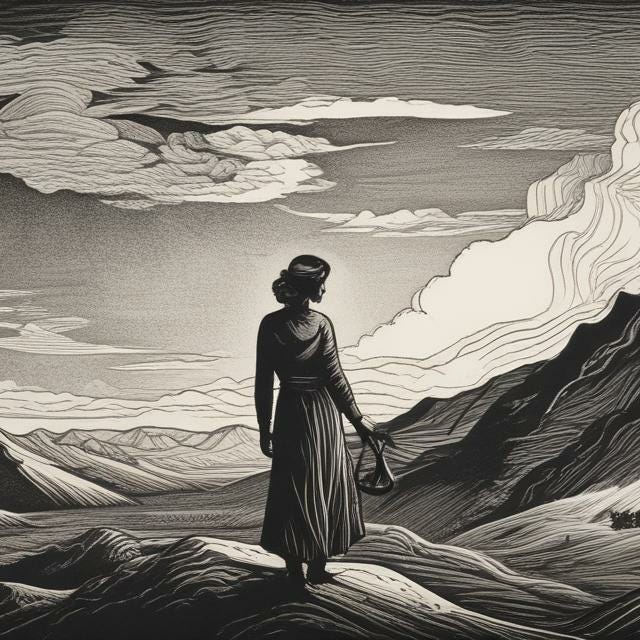Human/Parents Interview: Joy V. and PPD/PPA
Human/Mother welcomes Substack author of The Shrieking Cactus!
Human/Parents is an interview series that explores and illuminates various mental health topics that some parents face while simultaneously performing the most important job on the planet: raising the next generation. Guests are Substack creatives who are also parents dealing with one or more of Human/Mother’s rotating monthly mental health topics.
This month’s topic is postpartum anxiety and depression.
So, pour yourself that third cup of coffee, snuggle in, get cozy, and get ready to meet our next guest:
from !Hi, Joy! Thank you so much for being here. Tell us a little about yourself and your Substack. How did you find writing, or, maybe, rather, how did writing find you? What led you to start The Shrieking Cactus, and what is your goal for your newsletter?
Hi there! I’m a journalist and editor in Austin, TX. I’ve been writing professionally basically since my teen years, starting out at my high school newspaper and eventually becoming a healthcare editor. I’m married, and the mother of a very active middle schooler (#volleyballmom). My personal passion is anything wildlife and nature, but it’s been hard finding a way to make an income from that as a writer — at least one with health insurance and a 401k!
I started The Shrieking Cactus in 2023. I wanted to create a focused publication that’s tied with the themes of my book manuscript, which is about my journey trying to understand and accept the legacy of severe mental illness in my family. My (still unpublished) memoir also weaves in stories about the resilient wildlife of South Texas, where I’m from.
Let’s cut to the chase and get into your postpartum anxiety and depression experience. Tell us about the moment you realized you were struggling. Perhaps, you could provide us with some examples of what your PPD/PPA looked like when you were at your lowest.
I believe my PPD/PPA was almost entirely caused by my birth trauma and the resulting extreme sleep deprivation. Although it’s just a personal theory, I’m convinced that if we radically prioritized the sleep of new mothers, rates of PPD/PPA and psychosis would plummet.
Yes—preach, Joy! Snaps all around!
For me, my sleep deprivation started in late pregnancy. I was so uncomfortable. My hands swelled so badly they burned and then went numb, and my stomach was aching all the time. Both of these things were dismissed as “normal,” when in reality it was the onset of severe preeclampsia (the belly pain was actually my liver, I’d learn later). It got to the point I had ice packs in the freezer that were in the shape of my hands, because that was the only thing that relieved the hand pain.
Once I went into labor, early on I knew something was wrong and went to the hospital before my contractions had sped up. My blood pressure and pulse were high, but I was told it was “anxiety.” So, I was sent home, where I got even sicker and felt worse. My midwife told me it was probably dehydration. So my husband bought Powerade, and as soon as I drank it, I started vomiting all over my kitchen. At the same time, my water broke, simultaneously. After that, I was quickly admitted to the hospital, but all hell broke loose as my midwife didn’t know what was wrong with me. Both my daughter and I got very sick and required intensive care.
It’s a long story. I was hospitalized for a week. Let me summarize it like this: The hospital-related sleep deprivation paired with undiagnosed severe preeclampsia was catastrophic to my mental health.
As they tried to figure out what was wrong with me, there were so many interruptions to my sleep, and I was moved to seven different rooms in the course of my stay. Plus, I had a baby in the NICU. Worst of all, because this was in New York City, my hospital rooms were shared, not private. Having another new mom and her crying baby right next to me on the other side of a curtain made it claustrophobic on top of chaotic.
Oof! That last line just gave me flashbacks to my own overnight hospital stay in Manhattan after the birth of my first daughter in April 2020. The shared room experience during COVID sent my anxiety through the roof!
After a week of this, my nervous system was insanely over-activated, in part because the high blood pressure agitates your nerves (and can lead to a deadly seizure, which is eclampsia), but also because I didn’t feel safe and felt very trapped.
Once at home, I was locked in survival mode, and could not calm down. I could not sleep. I lost the ability to nap. I also had a lot of doctor and lab appointments to make sure my liver was recovering. My blood pressure was still hard to manage. It was incredibly exhausting and yet I could not relax.
What helped: I had been seeing a psychiatrist before I got pregnant, because I knew I was at risk of postpartum depression. Since my twenties, I have always gotten very bad PMS, which required medication (hormones) to treat. Luckily, I had no issues with my mood during pregnancy, fortunately. All that estrogen kept me happy.
But I was very lucky to have quick access to him after I gave birth. I was diagnosed with postpartum anxiety and PTSD. Within a few weeks, he got me on the right mix of medications, and helped me discover that the blood pressure medication I was on causes severe psychiatric side effects, and is only used in new moms when other alternatives don’t work.
How did PPD/PPA affect your ability to mother and bond with your child after giving birth? Does it still have an effect on the relationship you have with your child? In what ways (if at all)?
I loved her so much right from the start that I don’t think it affected our bond too much. She absolutely motivated me to get better. Eleven years later, I’m glad to say it doesn’t affect us.
The harder part is what it did to the relationship with myself. Even on the drive home from the hospital, I had whispers in my mind that I was a “bad mom.” Seeing other new moms made me feel panicky. I kept comparing myself to them and told myself I was horrible. As my sleep deprivation worsened at home, this harsh self-critical voice got worse. Although I never slipped into psychosis, I know I got close to the edge because of how much I hated myself. It was unreal. I also experienced disassociation when I first got home (not sure if it was my apartment or some facsimile, for example).
Along with listening to my psychiatrist’s advice to stop “white knuckling” and take my sleeping and anti-anxiety medication, one of the best things I did for myself (and my baby) was to stop breastfeeding. While of course I berated myself for being a new mom who resorted to formula, it meant I could take sleeping pills and anti-anxiety medication and focus on sleeping at night. My husband and mother-in-law did the night duty while I got 6-7 hours of sleep. That was huge.
How did PPD/PPA affect your marriage, and how did you and your partner handle that?
At the time, we had recently endured trauma together (my mother attempted suicide several times in the years before I got pregnant), and we were still reeling from that, but in some ways, that experience made us stronger. Still, we were challenged by just how intense the postpartum phase is. We were clueless about how bad maternal healthcare is, how demanding it is to care for a newborn even if you’re perfectly healthy, and how much you need a “village” to survive. I’m proud that we worked through it.
Could you share with us some ways you were able to cope with the experience? How did you find healing or help? Do you have any specific resources to share with our readers?
I don’t think I would have gotten better without my psychiatrist. I also started seeing a therapist, who helped me work through PTSD. I had intense flashbacks and nightmares. I still vividly remember trying to take a nap and jolting awake because I was dreaming a nurse was sinking a needle into my forehead. (I came home from the hospital with bruises on both hands and forearms from all the IVs and blood draws.)
As I got better, I also wanted revenge. I ordered all my and my daughter’s hospital medical records, which cost upwards of $400. I combed through them, driven to understand how this happened to me. Eventually I pitched and published a 3,000-word feature story in Cosmopolitan magazine about America’s crappy maternal healthcare system. That was critical to my healing! I also have a piece out this spring in West Trade Review about this entire experience. It’s titled “White Knuckling.”
For new mothers who are struggling right now with PPD/PPA, what advice do you have for them? Did you adopt a mantra, meditation, or growth mindset that was helpful to you throughout your experiences with PPD/PPA?
You may feel like you hate yourself and will never get better, but you will. It’s going to be brutal for a while. Don’t be afraid to stop breastfeeding to get more sleep (and/or to be able to take strong psychiatric medications). Lean on people you trust. If you start feeling like things aren’t real or that bad things are going to happen, tell others how you’re feeling.
This experience will be one of the most grueling things you’ll ever endure, and one day you’ll be amazed at how strong you are.
Absolutely. Thank you, Joy, for sharing that encouragement. I 100% agree with you. Now, onto the last question: Is there a question that I haven’t asked that you wish I would have? (And, pretty please, answer it! 🙂)
Yes – was there anything unusual or unique about your anxiety?
One interesting detail to my postpartum anxiety was the timing of it. I’d feel basically OK during the morning, but by around 2 p.m., I’d feel very anxious and panicky and sometimes had a full blown panic attack. I remember my forearms would tighten in this weird way, a sign it was about to start (along with the clock). I learned from my psychiatrist that it was “time anxiety.” It was basically overlapping with the time of day when I was most tired and in need of a nap, but because of my trauma and how I had to train myself to survive without sleep, my body was going into fight-or-flight mode instead.
Also, I was afraid to be alone with my baby, even though I typically love solitude. I think it was some sort of ancient instinct that my body knew it was better for me to have a “tribe” keeping me and the baby safe during a very vulnerable time. But in my depressed brain at the time, I thought it was a sign I was weak and a bad mother. In reality, it just makes sense to surround yourself with people you love and trust.
***
Wow—what a beautiful story of resilience and hope! Thank you so much for being vulnerable and sharing an important piece of your motherhood story with us,
! I appreciate your vulnerability and willingness to dive into such an important topic. I’m also a reader and fan of your newsletter, , and have found a lot of value in your shared words. I recommend it to anyone who is dealing with various forms and layers of mental health to subscribe today!If you or someone you know has experienced or is experiencing postpartum depression or anxiety, please consider sharing this post, commenting, or tapping that heart below. Tell us your story, offer any advice or wisdom gained through your own personal experience, and/or let us know which details of Joy’s story you found relatable, helpful, or hopeful.
Wherever you are in your journey, know that you deserve peace, hope, and love.








This is such an AMAZING series, huge hugs to Joy for putting so much vulnerability out into this piece (and the atty in me is fuming that the medical providers charged you so much for your records after a traumatic birth!!). These words are incredibly important and will undoubtedly help any reader feel seen in some way. Glad you're feeling better, and another fab job putting this together, Katrina ❤️
Why were you under the care of a midwife when you were clearly NOT a low-risk pregnant person. And who was supervising your midwife? These are important issues with respect to delay in diagnosis.